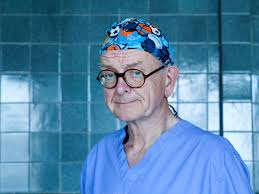Henry Marsh: The Visionary Neurosurgeon Changing Lives

Introduction
Henry Marsh, a renowned British neurosurgeon, has made significant contributions to the field of neurosurgery, intertwining his medical expertise with an exceptional understanding of patient care. His innovative approaches and notable publications have not only helped shape surgical techniques but have also brought to light the profound emotional aspects of treating brain conditions. Marsh’s work emphasizes the importance of patient-centered care and has garnered international attention.
Significant Contributions
One of the hallmarks of Marsh’s career is his commitment to the integration of art and science within neurosurgery. In his 2014 memoir, Do No Harm, he highlights the intricacies of performing brain surgery, often using poignant anecdotes that illustrate both the triumphs and ethical dilemmas faced in the operating room. This book received widespread acclaim, putting a spotlight on the personal struggles of surgeons and the patients they treat. Marsh’s experiences underscore the need for compassion in the surgical process, pushing the boundaries of traditional medicine.
In addition to his memoir, Henry Marsh has contributed to global medical practices by working in Ukraine, where he faced the challenges of neurosurgery in resource-limited settings. His experience in humanitarian efforts has not only expanded his own skillset but has also provided critical training and support to local medical practitioners, reinforcing the importance of collaborative healthcare.
Acknowledgments and Awards
Throughout his career, Marsh has been recognised with a multitude of awards for his pioneering work, including being appointed a Fellow of the Royal College of Surgeons. His passion for education and mentorship has further paved the way for the next generation of neurosurgeons. The stories of his patients and the transformative impact of his work continue to inspire those both within and outside the medical community.
Conclusion
Henry Marsh’s impact on the field of neurosurgery extends far beyond his technical skills; he advocates for a holistic approach that considers the emotional well-being of patients. As he continues to share his experiences and advocate for better medical practices, it becomes increasingly clear that his legacy will influence both future practitioners and patients alike. The conversations he has catalysed about the psychological implications of medical procedures are essential as healthcare continues to evolve. For readers, Marsh’s journey serves as a reminder of the balance between science and empathy in medicine, highlighting the need for a deeper understanding of both the human condition and the complexities of surgical practices.









